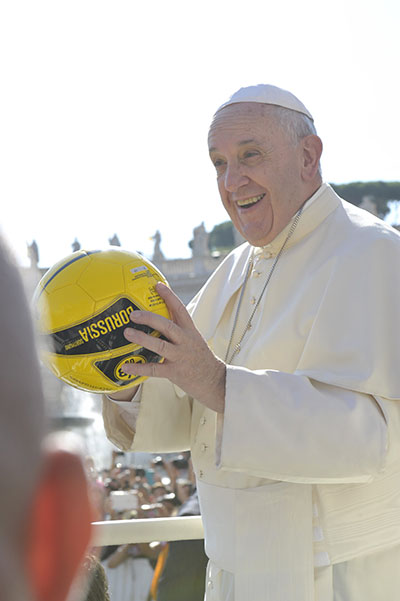By Father Roberto Cid -
This article is reprinted from Father Roberto Cid's weekly bulletin message to his parishioners at St. Patrick Church, Miami Beach. The video above is a production of Catholic News Agency.
With the FIFA World Cup in full swing, I thought I would share with you something I have learnt about its Catholic origins. Those of you who follow soccer and know the history of the World Cup, especially Brazilians, ought to recognize the name Jules Rimet. That was the name of the World Cup trophy until 1970. There was a rule that whoever won it three times would get to keep it. Brazil won it for the third time in Mexico 1970 and earned the right to keep the Jules Rimet Cup. A new trophy, currently sought by the participating teams, was designed for the World Cup Germany 1974 and used ever since.

Photographer: L'Osservatore Romano
Pope Francis holds a soccer ball in St. Peter's Square during the Wednesday general audience on August 26, 2015. "Giving the Best of Yourself," a document released June 1 by the Dicastery for Laity, the Family and Life, is the first Vatican document on sports.
This June, the English newspaper Catholic Herald published a story about Jules Rimet, who was president of FIFA for 33 years and is the man credited with creating the World Cup as a means of bringing warring nations together and to promote universal fraternity and solidarity among the peoples. His ideal was rooted in his deep Catholic faith and inspired by the teachings of Pope Leo XIII. The World Cup was not the only social initiative that Jules Rimet participated in. All of them were grounded in his Catholic faith.
In the same spirit that animated Jules Rimet, the Holy See recently published a document on the Christian perspective on sports. An excerpt follows:
“Giving one’s very best is a fundamental theme in sports, as athletes both individually and collectively strive to achieve their goals in the game. When a person gives his very best, he experiences satisfaction and the joy of accomplishment. The same is true in human life in general and in living out the Christian faith. We all want to be able to say one day, with St. Paul, 'I have fought to the end the good fight, finished my course, I have kept the faith�'
“The Church as the people of God has a rich and profound experience of humanity. With great humility, it wants to share and put this experience at the service of sports. The Church approaches the world of sports because it desires to contribute to the construction of an increasingly authentic, humane sport.
“Indeed, 'nothing genuinely human fails to raise an echo' in the hearts of the followers of Christ. Sport is a human universal and has taken on a new level of importance in our time and so it too finds an echo in the heart of the people of God.
“The Church understands the human person as a unit of body, soul and spirit, and seeks to avoid any kind of reductionism in sport that debases human dignity. 'The Church is interested in sport because the person is at her heart, the whole person, and she recognizes that sports activity affects the formation, relations and spirituality of a person'�
“... There has been a tendency recently, in part because of the way the history of sport has been written, to think that the Catholic Church has only had a negative view of and impact on sport, especially in the medieval and early modern periods, because of negative Catholic attitudes toward the body. But this is based on a misunderstanding of Catholic attitudes toward the body during these periods and it misses the positive influence of Catholic theological, spiritual and educational traditions on sport as an aspect of culture.
“'The Christian attitude towards sport as towards the other expressions of the person’s natural faculties such as science, learning, work, art, love, and social and political commitment is not an attitude of rejection or flight, but one of respect, esteem, even though correcting and elevating them: in a word, an attitude of redemption.' An attitude of redemption is present in sport when the primacy of the dignity of the person is respected and sport serves the human person in his or her integral development.
“As Pope Francis put it, 'The bond between the Church and the world of sports is a beautiful reality that has strengthened over time, for the Ecclesial Community sees in sports a powerful instrument for the integral growth of the human person. Engaging in sports, in fact, rouses us to go beyond ourselves and our own self interests in a healthy way; it trains the spirit in sacrifice and, if it is organized well, it fosters loyalty in interpersonal relations, friendship, and respect for rules'�
“The Church has been a sponsor of the beautiful in art, music and other areas of human activity throughout its history. This is ultimately because beauty comes from God, and therefore its appreciation is built into us as his beloved creatures. Sport can offer us a chance to take part in beautiful moments, or to see these take place. In this way, sport has the potential to remind us that beauty is one of the ways we can encounter God.”

